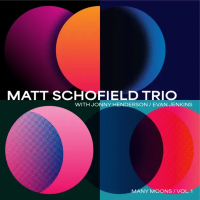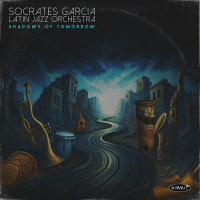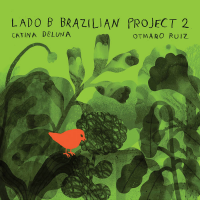Home » Jazz Articles » Extended Analysis » Derek & The Dominos: Derek & The Dominos: Live at the Fillmore
Derek & The Dominos: Derek & The Dominos: Live at the Fillmore
Eric Clapton
guitar and vocalsb.1945

Miles Davis
trumpet1926 - 1991
That impressive bit of musical history occurred before Clapton even released his first solo recording, Eric Clapton (Polydor) in August 1970. Shortly before his solo effort and while on the road with Delaney & Bonnie & Friends (recording Delaney & Bonnie & Friends with Eric Clapton (Atco, 1970)), Clapton conceived his final super group, Derek and the Dominoes. Absconding Delaney & Bonnie's rhythm section with Oklahoma bassist Carl Radle, Memphis keyboardist Bobby Whitlock, LA drummer Jim Gordon and adding guitarist Duane Allman four songs into his new project, Clapton put together history. Between late August and early October 1970, the band entered the Criteria studios in Miami, Florida under Allman Brothers producer Tom Dowd and recorded the 2-LP Layla & Other Assorted Love Songs, which was released in November of that year. Clapton and the band, who had toured prior to recording, returned to touring, wrapping up their blues-rock Gotterdammerung with their final concert date on December 6, 1970.
The myth surrounding Layla & Other Assorted Love Songs is thick. Clapton was woefully in love with the Beatles'

George Harrison
guitar1943 - 2001
During this whirlwind of unrequited love, chemical dependency, depression and creativity, Derek & the Dominos: In Concert (Polydor, 1973), was captured at the Fillmore East culled from two sets each performed on October 23-24, 1970 sans Duane Allman. This original 2-LP set was the precursor to this selection of the Ten Best Live Rock Recordings, Derek & the Dominoes: Live At The Fillmore.
Live At The Fillmore is not simply a remastering of In Concert with previously unreleased sides. It is actually a different assembly of music extracted from the same set of shows used for In Concert. Live At The Fillmore sports six of the nine pieces originally included on In Concert. Two songs, "Key to the Highway" and "Crossroads," were previously released on Crossroads (Polydor, 1988). Three of the five previously unreleased songs are different recordings of same pieces appearing on In Concert ("Why Does Love Got To Be So Sad?," "Tell the Truth," and "Let It Rain"). The remaining two unreleased songs, "Nobody Knows When You're Down and Out" and "Little Wing" have never been available in a live version
Beyond all of this discographical stuff is Eric Clapton as guitar god in the wake of the death of Jimi Hendrix, who passed away from a barbiturate misadventure a month before these shows. Clapton is at the height of his power, just prior to his recording semi-retirement to address his raging heroin addiction and deepening depression. This is rarified music, visceral, exciting, primal, extended, almost but never quite self-indulgent, as is most of the music on Clapton's later Crossroads 2: Live in the Seventies (Polydor, 1996). However, then Creem magazine critic Lester Bangs did not concur, describing the music (from In Concert) as:
"[T]his piece of dreck represents one of the nullest excesses in a time when we've all been so drenched in excess as to be totally acclimated to it. . . . The recording quality is poor, the vocals are muddy and barely passable in the first place, but where [the album] really disintegrates is the solos. . . . [T]his is mostly just muddled idiot riffing for no reason at all . . . it's the dullest drabbest flattest saddest thing I've heard in ages."
Ouch!
"Blues Power," "Tell the Truth," and "Key to the Highway" are defining. "It's got To Get Better In A Little While" transcendent. These song bore the beginnings of what would become the drunk bloated Clapton in the '70s, but was still a ways off. The leader and band were relaxed and loose. Clapton never made music like this after Derek and the Dominoes. The insipid "Wonderful Tonight" might be a commercial success, but it is no "Have You Ever Loved a Woman" and the sincere "Tears in Heaven" may be heartfelt, but it is no "Layla"; they simply lacks the despair of these older songs. Had Clapton had no other recordings than the Dominoes, he would still have assured his place in rock history by these studio and live recordings.
Here in the early throws of the 21st Century there have been a spate of completest box sets, expansions of previously released recordings, devoted to famous live performances from the early 1970s.

Joe Cocker
vocals1944 - 2014

Aretha Franklin
vocals1942 - 2018

King Curtis
saxophone1934 - 1971

Paul Butterfield
harmonica1942 - 1987
Derek and the Dominos played a total of four sets over October 23-24, 1970 and in light of the above re-releases, it now may be the time to release the whole shebang. It is certainly long overdue.
The Ten Best Live Rock Recordings ">
Track Listing
CD1: Got To Get Better In A Little While; Why Does Love Got To Be So Sad; Key To The Highway; Blues Power; Have You Ever Loved A Woman; Bottle Of Red Wine. CD2: Tell The Truth; Nobody Knows You When You're Down And Out; Roll It Over; Presence of the Lord; Little Wing; Let It Rain; Crossroads.
Personnel
Eric Clapton: guitars, vocals; Bobby Whitlock: keyboards, vocals; Carl Radle: bass; Jim Gordon: drums.
Album information
Title: Derek & The Dominos: Live at the Fillmore | Year Released: 2001 | Record Label: Polydor Records
Tags
Comments
PREVIOUS / NEXT
Support All About Jazz
 All About Jazz has been a pillar of jazz since 1995, championing it as an art form and, more importantly, supporting the musicians who make it. Our enduring commitment has made "AAJ" one of the most culturally important websites of its kind, read by hundreds of thousands of fans, musicians and industry figures every month.
All About Jazz has been a pillar of jazz since 1995, championing it as an art form and, more importantly, supporting the musicians who make it. Our enduring commitment has made "AAJ" one of the most culturally important websites of its kind, read by hundreds of thousands of fans, musicians and industry figures every month.







 Buy Now
Buy Now



















